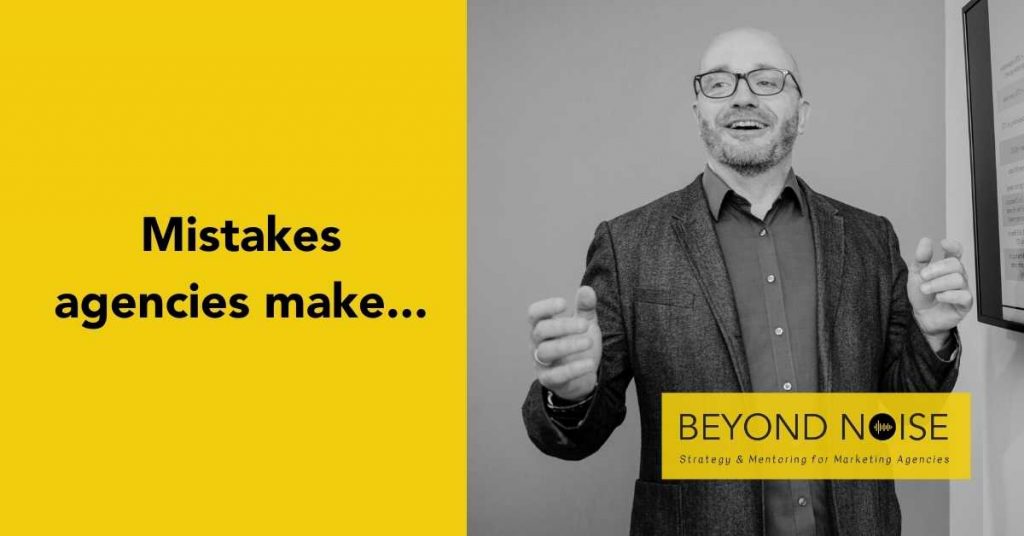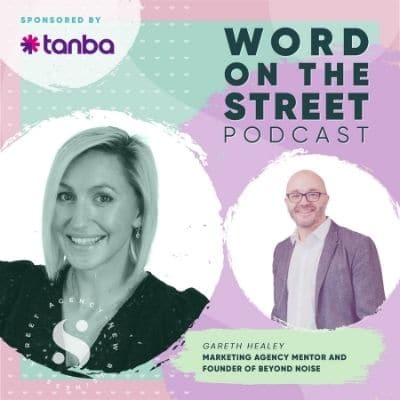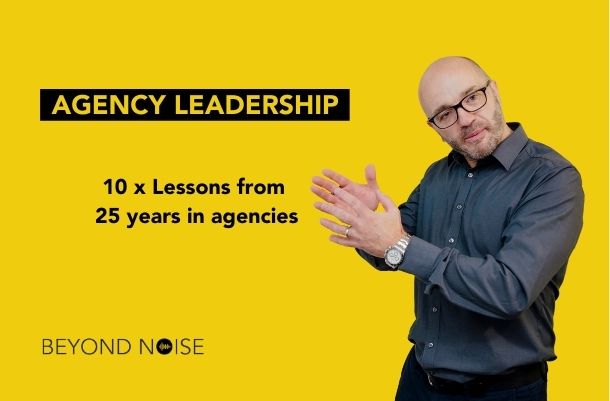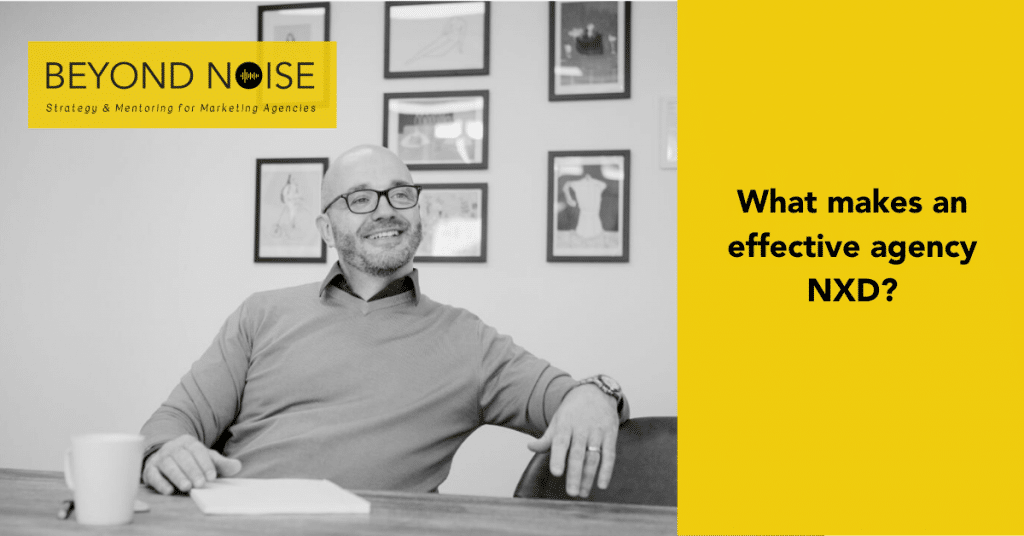
How to make your agency more valuable

How to make your agency more valuable?
Agency owners often ask me how they can make their agency more valuable. This is indeed a valuable question in itself. Whether you’re thinking of selling your agency now, in 6 months time or many years in the future, a focus on what drives value in your firm is a game changer. It can not only bring greater rewards upon an exit, but also make you more successful in the short term. Here’s my Top 12 tips for making your agency more valuable and more attractive to potential buyers (in now particular order, except perhaps for the first one!)
1. Size
When it comes to agency valuations, size matters. An agency’s value is usually in its ability to generate cash. The more profit you make, the bigger the valuation you’re going to achieve. If you want to be an acquisition target and realise some serious exit money, you really need some critical mass. Aim for > £500k EBITDA.
2. Track Record
More valuable agencies are more consistent agencies. Firms that can show consistent year on year growth. Nobody wants to buy a rollercoaster. A track record of growth will attract better buyers and bigger valuations.
3. Recurring Revenue
Where your profit comes from is as important as how profitable you are. Acquirers prefer to see regular monthly income in the form of fees and retainers rather than project work that, although profitable, is also highly volatile.
4. Management Information
A well run business with good management accounts gives buyers comfort. Due diligence will still be undertaken, but the risk of the purchaser uncovering nasty surprises or issues is reduced. The lower the risk, the greater the value.
5. Balanced Portfolio
A dominant client is a huge turnoff for most buyers and often reduces the value of an agency. Unless they have a strategic reason for wanting to acquire the client, most buyers will be concerned by a single client which is > 20% of revenue.
6. Contracts
As the value of an agency is in its ability to generate income, the security of that income is paramount. Contracts provide security. Client income built purely on personal relationships increases risk and reduces the value of an agency.
7. Leadership Team
If you want to achieve a high valuation and exit your agency, you need to put yourself out of a job BEFORE you sell. An agency that’s reliant on its founder is far less valuable than one that has a strong leadership in place running the business. A team that could buy the agency themselves or be easily integrated with a large.
8. Pipeline
Your ability to win new business makes your agency more valuable. If an acquirer can not only see a good pipeline of current opportunities, but also an established and effective sales and marketing function that generates leads, then they will pay more for your business.
9. Brand
An agency’s reputation and profile can not only help it to win new business it can also attract talent. Your brand, like any brand, has a value. Awards and industry recognition are not particularly valuable in isolation, but they can enhance your brand and credibility as a service provider and an employer.
10. Assets
Most agencies have few physical assets, but bespoke tech, software and intellectual property can all contribute significantly to creating a more attractive acquisition and a more valuable agency.
11. People
The most valuable operational asset of any agency is its people. Unfortunately, whilst they might be under contract, they’re free to leave whenever they want. Nevertheless, the better people you employ, the more attractive your agency will be for an acquirer. You should also consider your people structure. An agency with full time employees is likely to be more valuable than one that operates almost entirely with freelancers.
12. Purpose
When comes to business value, financial performance is paramount. However, society is placing an increasing importance on ethical trading and how we put purpose ahead of profit. Larger acquirers offering larger valuations will increasingly consider how your approach to CSR will fit in with their business. The better the fit, the higher the value.

Mistakes agencies make

Mistakes agencies make ...
The journey of building a digital agency is not the same for everybody. One of the mistakes agencies make is looking for a silver bullet that will make them a success. Another is underestimating the time it takes to build a business. There are 4 key milestones in the life of any digital agency:
STAGE 1 – Micro Agency (2-4 people, < £250k revenue)
STAGE 2 – Lifestyle Agency (5-15 people, < £1M revenue)
STAGE 3 – Growth Agency (16-50 people, < £5M revenue)
STAGE 4 – Established Agency (50+ people, > £5M revenue)
Navigating each stage requires plenty of hard work, desire, determination and a little bit of good fortune. But it also needs something else; at each stage you need a fundamental change of approach. “What got you here, won’t get you there” is a crucial mantra for growing an agency.
For many people, getting to STAGE 1 is a major achievement. Becoming a Micro Agency means they’ve broken away from being a freelancer. They’re now an employer and running a small business. But at this stage, they’re still spending the majority of their time delivering client work.
To move to STAGE 2 requires that they delegate at least some of the delivery work and start to develop their team. I consider agencies at this stage to be Lifestyle businesses. Its possible to run a good company, enjoy what you’re doing and make some decent money running this type of agency. Some founders are happy at this level. For most people though it’s not enough. They want growth. They want to create a valuable business asset. Getting beyond £1M in revenue is an important milestone which many smaller agency owners focus on to fuel their ambitions.
STANDSTILL agencies
Some agency owners achieve 7 figure revenue easily, others find it more of a struggle. Despite a lot of time and effort, many never manage it at all. The reality is that most of the people that do break the £1M barrier get stuck at some point beforehand. They usually find themselves north of £500k revenue with around 10 people when their growth hits a plateau. These are the archetypal STANDSTILL agencies that I describe in my award-winning book STANDOUT OR DIE. The more time that passes and the more growth stagnates, the more frustrated and disillusioned the agency founder becomes.
There are many contributing factors as to why agencies can find themselves at a STANDSTILL. But the over-arching reason I see time and time again is the fact that they don’t recognise that to grow they need to change. One of the mistakes agencies make is not realising what got them to this point, is not going to get them much further.
STAGE 1 - A fight for survival
People rarely start completely from scratch when setting up an agency. Most new agency owners have some established relationships or a network they can tap into to start them off. But getting going is usually a struggle. The need to make some money and get the agency off the ground means that new founders usually accept work from any type of client. They’re in survival mode.
Often agencies at this stage also take on projects needing skills outside their own interest or skill set. Few manage to focus on a type of client or core service provision. The result? Another agency is born and starts to grow. It might even reach STAGE 2, but it has a mix of clients across different sectors with different needs. Its offer can soon become what I call diluted (but what these agencies more commonly refer to as “full service”).
STAGE 2 - More of the same please?
They say success breeds success, and once agencies experience early growth they assume it will continue. It’s easy to see why they think adding more clients, more services and more people we will propel their revenue to the million and beyond.
Agencies wanting to get out of STAGE 2 tend to expand their thinking. One of the mistakes agencies make is to assume broader is better. If they do more diverse work for more diverse clients using people with more diverse skills then growth will follow. Not necessarilly.
It’s counter-intuitive, but the key to getting from STAGE 2 to STAGE 3 is not breadth but depth. Rather than expand, you actually need to narrow what you offer (and who you offer it to). You need to become more picky about who you work with, not less. You want deeper relationships with fewer clients. You need to offer fewer services not more. Your task is not to grow your team, but to grow a team of experts.
In STAGE 2 you shouldn’t be in survival mode, so you shouldn’t be using survival tactics. Adding new services and working with more diverse clients might make your agency a bit bigger, but it will also cause you to become less focussed and bring you more problems. To get to the next level, STAGE 2 agencies need to be in growth mode and when growing agencies at this stage, less is more.
Step back to spring forward
In the UK 20% of businesses fail within their first year and 60% within their first three. When people first start out running an agency, it’s entirely understandable that they will do practically anything for anybody to make their business a success. It’s a crucial time.
Once established though they must change their approach. If they want to avoid becoming a STANDSTILL agency they need to take a step back and refine their business model and offer. They must become more focused in terms of the clients they are targeting and what services they are providing. This is the key to breaking through the £1M revenue barrier.
Once you get beyond 7 figures and into STAGE 3 of your growth trajectory, you might then decide to broaden out your offer. But in order to get there you need to be more single minded. If you don’t want to call this “niching” then so be it, but whatever you do, sharpen your focus. A sharp knife cuts through far better than a set of blunt ones.
SUBSCRIBE TO OUR
NEWSLETTER

Are you wasting time running your agency?

Are you wasting time?
STANDSTILL agency owners don’t like to waste time on the detail and minutiae of running their agency. They’d rather spend their time looking for new projects and new clients to give them more revenue. Nothing wrong in that, but they risk missing opportunities that are right under their noses.
STANDOUT agencies don’t like to waste time at all. They don’t just look for more fuel for their business, they tune the engine so that they can deliver optimum performance from the fuel they already have.
All agencies know what they ARE billing their clients, but STANDOUT agencies also know what they AREN’T billing. Armed with this information, they can release the latent capacity in their firm.
What is latent capacity?
Latent capacity is the gap between the time you ACTUALLY bill to your clients and the total available time that you COULD bill.
Left unchecked, latent capacity is ultimately waste. It’s time you are wasting running your agency. It’s also a huge missed opportunity to deliver more revenue with the same resources. Calculating latent capacity is relatively simple, yet few agencies take the time to do so.
SPOILER ALERT: Calculating latent capacity does need you to embrace, track and charge billable hours. Look away now if billing hours is something you have a fundamental issue with(!) Stay with me though if you’re on board with tracking hours (even if you don’t do it). This stuff is definitely for you.
Identifying your latent capacity
No agency can charge 100% of their time to clients. People are not machines. We need holidays, well-being time, L&D, time to socialise and time to run the business itself. We also make mistakes, take longer to deliver work than planned, get distracted, and sometimes, of course, we can’t work at all due to illness.
Even taking these considerations into account, agencies often still bill way below the time they should each month. There are numerous reasons for this,. Often time is being wasted in over-servicing, duplicating work, re-work etc. The bottom line is that if you’re running an agency and your time is not being effectively converted into revenue you have a problem. Don’t despair though, where there are problems there are also opportunities.
Your opportunity is to minimise your latent capacity. To close the gap between what you could bill and what you actually bill. In doing so, you’ll become more efficient and make more money with the same resources. You’ll be truly scaling your agency as opposed to just growing it.
Calculating latent capacity
Latent capacity can be calculated a number of ways. It can be expressed annually or monthly, in financial terms or in time (hours). It can even be monitored as a percentage.
To keep things simple, lets focus on identifying the monthly financial latent capacity for your agency. Before you start, you’re going to need to know the following:
– The total amount of time you billed last month in £. N.B. We’re working with billable time / fee income only here. Split out any media or other such billings if you have them. (A)
– The number of chargeable – fee earning – people you employ (include contractors if applicable). N.B. This might not be a whole number as you may need to account for part-time people. (B)
– Your chargeable ceiling. The maximum hours that a chargeable person can bill in a year. This is a bit trickier as it includes a few more variables. I work with 1665 hours per person per annum. Your agency may differ due to your geography and/or policies. The figure of 1665 is derived from: 222 chargeable days per annum (222 = 5 days per week x 52 weeks minus 20 days annual leave minus 8 Bank Holidays minus 10 days average sick leave allocation) multiplied by 7.5 working hours in a day. Adjust and use your own figure if you need to. (C)
– Your utilisation rate. You won’t bill every hour available so you need to apply a utilisation rate. I work with 75%. You might want to go higher or lower, but essentially we are saying that of the hours available, we only expect to be able to charge a maximum of 75% of them. The remaining 25% is breaks, other activities, etc. N.B. Use the rate you think you actually achieve, not an aspirational target. (D)
– Your hourly rate. Some agencies charge different rates for different people and different clients. Some agencies charge a blended rate. Your rate will also differ due to your location and the type of work you do. Ultimately you need a figure to work with. I commonly use £85 per hour for my work here in the UK. N.B. Use the rate you think you achieve, not a rate you wish you could charge or others charge. (E)
Doing the maths
Now you have the data, you can do the calculation. I know this looks a little daunting, but with the data above, it’s really quite simple.

To illustrate an example, lets consider an agency currently billing £55,000 (chargeable time) per month using 8 chargeable people. They have a 1665 hour chargeable ceiling, a 75% utilisation rate and use an hourly rate of £85. Our calculation would look like this:

This agency’s latent capacity is £15,763 per month. They are billing £55,000 but they have the potential to bill £70,763 per month.
They could go from a £660k agency to a £849k agency without increasing the size of their team. Moreover, much of that increased revenue would fall straight down to net profit level. They could go from breaking even to making a £189k profit.
Remember...
These calculations are not perfect, they should be used as a guide. It is unlikely that you will close the latent capacity gap completely. It should also be noted that the extra hours will not fill themselves. You may need additional client work to fill the gap.
Crucially, you have identified efficiencies you can make and capitalise on. You can focus on closing the latent capacity gap and you finally have a use for those timesheets!
Please don’t let anybody tell you looking at latent capacity in your agency risks making your business into a sweat shop. Your chargeable ceiling and your utilisation rate already have holidays and downtime included within them. If you want to adjust your rates to be less aggressive than mine then please go ahead, you may well still uncover some capacity that you didn’t realise you had. It could transform your agency.

Gareth Talks to Katie Street about creating a thriving agency

I spoke with the lovely Katie Street, Founder of Street Agency about how to create a thriving digital agency, We also talk about:
- What advice would you give to new agency owners looking to grow?
- What are the biggest mistakes agencies/ agency owners make?
- What learnings do you have from buying and running an agency?
- How can agencies cut through the noise and become more visible to the brands they want to work with?

A day with Polymensa

Leeds welcomes Polymensa
Last Friday Alex Craven and I joined the effervescent Daniel de la Cruz and his Polymensa agency group as they visited a sunny Leeds for their monthly get together. Billed as experts in residence, we joined 7 awesome agency owners from across the country for a day of problem-solving, discussion, eating, more eating, and even a spot of cake decorating (yes really!)
Everybody agreed that the session was a massive success. It’s incredible what a day out of the office in a relaxed environment with supportive people can do to get you thinking and re-charge your agency batteries.
Once the day had finished and the aftertaste of the chilli chocolate we sampled had finally subsided, I had chance to reflect on what the key themes of the discussions were. As ever with these types of sessions, we covered a lot of ground. Much of it was confidential of course, but 3 things stood out for me:
1. Imposter Syndrome
2. P & P
Your positioning provides CONTEXT. If you are well positioned as an agency you’re not – necessarily – in a unique space but you can easily point to the fact you do something for someone (N.B. Not some things for everyone!) You’re also comfortable with referring to yourself as a particular type of agency. You know what agency label you most closely associate with and avoid the generic catch-all terms. This context enables prospective clients to find and choose you more easily. It also allows others to quickly decide that you are not for them. This is a good thing. It saves everybody wasting time and money.
Last week’s meeting was a reminder to me that whilst these elements are interlinked, they are not interdependent. You can solve one but not necessarily the other. We had some extremely successful and well positioned agencies around the table at Polymensa. Nevertheless, by their own admission, a few could still do with some work on their proposition. They could improve the message that they put into the market.
Key Learning: You can be so close to something that you can’t see it clearly. Positioning and Proposition are great examples of this in action. When you get experienced and impartial people to help you, you can usually start to see things differently and progress can be made.
3. Creating and nurturing a Management Team
The 3rd dominant theme of day wasn’t a surprise to me. With so many growing agencies in the room, it was only natural that many of them were preoccupied with establishing, developing or improving their management teams. When I ran an agency we spent a lot of time trying to create the right management structure. As we grew we realised that this needed to continue to evolve and adapt it.
You may be focused on putting a team in place to take some of the growing responsibilities away from you. You may wish to step back and let people run the agency for you. You may even be starting to plan for the agencies future without you and establish a team capable of taking the business forward. Whatever the scenario, you have a lot of variables to contend with. You might have roles to fill in a management team, but you also have relationships, respect and loyalty to observe. Particularly to those people who have supported you on the journey so far. Fitting all these pieces together effectively is sometimes a difficult puzzle to solve.
Key learning: My advice when looking at forming and developing management teams is always to take the personalities and individuals out of the equation. Decide what roles you have to fill in your senior team. What support and input do you need from the people around your top table? How many people should there be? What will they be responsible for? What are their key deliverables in terms of running the agency with you? Once you have identified the roles, where you can put the names of the people you have in the seats you’ve identified. You will soon see if you have clear gaps, or more usually where you have somebody in the required role that is just not quite delivering what you need. Often the question is then how you can help them develop and deliver more, but it may also be a question of replacing them. This may not necessarily mean replacing them in their day to day role, but bringing somebody in who is more capable and comfortable with managing the business. If you’re a CEO who is struggling to see the picture clearly, an NED or Chair who can be more impartial can often help you make progress quicker.
Thank You
Thanks to Daniel for inviting me to such a fantastic session. It was great to spend some time working with like-minded people and see the power of the hive mind in action once again. Particularly after so many months of us being more isolated due to COVID.
Thanks also to Neil Adams and his team at Powerhouse for hosting us all and laying on some great food and entertainment.

The secret to growing a small agency

Growing a small agency
Whilst my own experience was running a big business (£12M+ Turnover and 175 staff), as an agency coach I love working with people growing a small agency. Owners of smaller agencies are usually bright, driven and eager to learn. What’s more, they can make decisions and act fast. They don’t need to consult or engage other people. As a consequence, I can usually make a bigger difference, more quickly, to their business
Whilst small agency owners share some positive traits, they also make similar mistakes. Growing a small agency is hard. Each business is unique, but you can fall into the same traps or run down the same blind alleys. One of my roles as an agency coach is to help my clients avoid these. A mistake I often see is the fixation people have with the concept of working on the business not in the business. The mistake is not in embracing the idea itself, it’s the way people often misinterpret the concept. They also overlook a fundamental challenge they need to overcome first. Before you can work on the business, you first need to get to a position where you are running the agency (and not delivering the work).
The Emyth
The concept of working on the business not in the business is well known, but fewer people are aware of its origins. The idea was from Michael E. Gerber in his 1986 book The Emyth. Whilst the book is over 35 years old, the concept is the most famous of many ideas it promotes that still apply today. Working on the business i.e. spending time thinking about the future of the business growth and development of the agency, is a sound concept. But for people growing a small agency it’s difficult to achieve.
In The EMyth, or Entrepreneur Myth, Gerber claims it’s a fallacy that most businesses are started by entrepreneurs (people who go into business with a vision of a company they want to create that doesn’t rely on their own ability to produce results). I find this particularly true for agency owners.
The Practitioner's Curse
Most agencies are started by what I call “practitioners”. People who create a business so they can work for themselves. This is a very different mindset to the entrepreneur who creates a business to work for them. Practitioners assume that understanding the technical or creative output of their business means that they’ll be able to grow an agency around their skills. It’s an assumption that’s not true.
You may be a great graphic designer. You may have the technical skill to produce brilliant visual communication through type, photography, and illustration. But it doesn’t mean that you understand what it takes to build a graphic design business. Nor does it mean you will be great at managing other people doing graphic design for you. Neither does it guarantee you have the technical skills, or desire, to operate the finance, marketing and operational functions of an agency.
Gerber claims the Emyth is the primary cause of the failure rate of businesses. According to Fundsquire, 60% of businesses don’t make it past the first 3 years. Twenty-three per cent of these fail because they don’t have the right team running the business.
Agencies have an advantage over many types of startups. They don’t have a capital intensive business model and can operate with more agility than other types of businesses. I’m sure many agencies have failed for the reason Gerber suggests. I’m certain many more are trundling along with founders that have lost their passion, or aren’t enjoying work anymore. The “Practitioner’s Curse” as I call it is why people struggle growing a small agency into anything of significant size.
The key to growing a small agency...
If you are intent on growing your small agency into a larger business, you must do 3 things:
1. Change your mindset – If you’re in practitioner mode, you will never grow your agency. You must except that to grow your agency you need to grow yourself. You must do things differently. What got you to this point, will not get you to the next stage. You need to escape the Practitioner’s Curse.
2. Come off the tools – Before you can work on the business you must get to a position where you’re spending most of your time running the business. If you’re a practitioner you must first come off the tools. A friend of mine runs a construction business. He built it from the ground up. Years ago he worked for other people laying paving stones. Skilled and physically demanding work. He refers to his own progression, and those of the people he now employs as foremen to manage his teams, as coming “off the tools” i.e. managing not delivering the work. Many smaller agency owners overlook the difference between running the business and delivering the business. They exacerbate their situation by making the wrong hires. I know small agency founders who have hired operations and admin people whilst they themselves remain as the key point of delivery. They wonder why they can’t grow the agency, but they’ve created a business where they’re effectively working for the people they employ. They are on the tools themselves and are being fed more and more work creating a capacity and management nightmare. I know other agency owners who don’t want to come off the tools. They’re afraid that if they don’t design or code they’ll lose their technique or be passed in skill by others. They might be right, but if they don’t stop being a practitioner, they never start growing a small agency.
3. Work on the business – Once you are not delivering and running the agency, you can’t start to think about growing and developing it. Beware though, this is a transition. Many agency owners I meet try and change their role completely. They make the mistake of thinking that, overnight, they should delegate all operational tasks and focus solely on the future. This is foolish and almost impossible to do in a small people-based agency. As a founder you will have to find the time to do both. The key to devoting the time to thinking about the business and the future is prioritisation. You can’t always let operational work get in the way. This is where an agency coach or mentor can help you.
Are you working on your agency or in your agency? More importantly, are you working for the agency or is it working for you? Are you still trapped on the tools yourself? If so, your first job is to escape the Practitioner’s Curse.
If you want to grow your agency, you must spend time away from running the day to day. But you must first ensure you fill in behind you and make sure you’re not delivering the day to day. Don’t paint yourself into a corner where you remain the key point of delivery. Your priority must be to extract yourself from the delivery in favour of the running of the business, then move from running to managing the agency. Only then can you think about developing and growing it.
SUBSCRIBE TO OUR
NEWSLETTER

Agency Leadership – 10 Lessons from 25 years Experience

Agency leadership in challenging times
Thankfully we appear to have light at the end of the tunnel with regards to controlling the spread of COVID-19 here in the UK. The last 12 months have been a battle for all of us on so many levels. Running any type of business has been a huge challenge. Agencies have struggled, but unlike people in hospitality, at least we’ve been able to trade during the lockdowns (albeit in very challenging circumstances). The impact of Coronavirus has tested our agency leadership abilities to their limits.
Throughout the pandemic I’ve seen so many examples of agency owners stepping up and leading their business through the dark times. Not all have succeeded of course, but I know plenty of agencies that have not only survived but thrived. Regardless of their performance, all agency leaders have my admiration for the way they’ve stepped up.
Sadly, the tough times are not over. As yesterday’s budget illustrated, the post COVID-19 economy will take years to repair. It’s not politicians that will do this of course, it’s business people and their staff that will fuel the recovery. Many skills will be required to make it happen, but leadership will be paramount in getting agencies, and the country as a whole, back on its feet.
Agencies need leading more (not less)
Despite their increasing utilisation of technology, agencies are people businesses. The business model relies on the talent of its staff. The expertise and ability of its people is vital to the success of any agency.
Regardless of how talented they are individually, all successful groups of people need great leadership. Lack of effective leadership is one of the major reasons why agencies fail to achieve their potential.
Some people would have you believe that modern business with its digital technology, flat organisation structures, agile methodologies and the attitudes of the younger workforce, means that leadership is not as important as it once was. I fundamentally disagree. Leadership remains a critical success factor for any organisation. It will be paramount in surviving and thriving commercially in the years to come.
Leadership can be learned
Leadership is not for everyone of course. Many believe leaders are born not made. I certainly think that it helps if you have a natural aptitude and desire for leadership, but leadership skills can be developed over time if the desire and need exists.
Some agency owners find they reach a ceiling when their business grows to a certain level. They started their agency for different reasons than to lead a group of people. Many never aspired to be the leader of an organisation at all. Success has forced them into that position.
Whilst natural talent is important, leadership skills can be learned. Expensive courses are not necessarily required for this to happen either. Experience counts for a lot, but I always think the catalyst for great leadership is self-awareness.
If you understand and appreciate your own strengths and weaknesses you can improve, compensate and utilise other people to support you in leading a business. Developing self-awareness as a leader will strengthen not only your individual performance but your agency performance as well. Self-awareness is a journey that doesn’t have a finish line. It’s an ongoing process of learning and adapting.
Top 10 Agency Leadership Lessons
In my 25 years of working in and leading agencies, I’ve certainly become more self-aware. I’ve also learnt a few things about leadership over the years (mostly from observing other people and their leadership qualities). I’ve taken my leadership lessons from all sorts of sources both inside and outside of agencies. I’ve even looked to people like Sir Alex Ferguson, who, as an ardent Manchester City fan I struggle to like, but can’t help but admire.
I’ve excelled at some aspects of leadership (and struggled with others). In a time when effective leadership is more important than ever, I’ve listed my Top 10 leadership lessons below. They’re in no particular order of importance, but they’re ALL important:
1 – BE CONSISTENT – Agency leaders are bright people who are full of ideas. This can mean they’re often flying around in all different directions. Unfortunately, this can lead to inconsistent working and decision-making. Consistency builds trust and trust in any leader is vital. Develop what I call a leadership rhythm. Weekly and monthly habits where your people can expect to hear, see or interact with you.
2 – REMAIN FOCUSED – Working “on” the business is important, but there’s a fine balance here. Don’t get bogged down in the detail, but don’t expect what you don’t inspect. Make it your business to periodically look under the bonnet of the agency to make sure you like what you see.
3 – RETAIN OWNERSHIP – The people that own the client relationships own the agency. Delegation and empowerment of the team are vital (as are contractual agreements), but don’t remove yourself too far from the client base that you become invisible. You never know when you might need to step back in.
4 – STAY ACCESSIBLE – Don’t distance yourself from your people. Even if you have an effective management team, don’t build barriers between yourself and the people in the agency. “Come to me with solutions not problems” is an overused phrase in my opinion. The day that people stop coming to you with their problems is the day you’re no longer an effective leader.
5 – COMMUNICATE (LIVE) – Always communicate in person whenever you can. Don’t hide behind email, Zoom or Slack. Technology cannot beat getting the agency all together in a room and speaking to them (when that’s possible of course). Do this regularly, even if it’s not in your comfort zone or something you enjoy.
6 – INSPIRE DON’T CLONE – Diversity in all its forms is a wonderful thing. Be clear on what attributes and personalities work best in your agency, but don’t try and recruit everybody in your own image. The values need to be more or less aligned, but not everybody needs to be the same type of personality. You’re amazing, but your way is not the ONLY way. Inspire don’t dictate the agenda.
7 – RESIST COMPLEXITY – Great leaders are great simplifiers. Your team will get frustrated with the added complexity of constant shifts in direction. They’ll thank you for making their lives simpler and easier.
8 – EMBRACE CHANGE – As your agency grows your leadership style must grow with it. Some tried and trusted methods and approaches must remain, but you must adapt. As your agency gets bigger and more complex, you can’t lead it in the same way you did when there was a handful of you sat around a few desks.
9 – EXPECT LONELINESS – The responsibility of leadership is often hard to bear and a lonely occupation. Try and surround yourself with trusted partners or advisors to help share the burden and allow you to discuss your ideas and vent your frustrations in a safe space away from the wider team.
10 – ENJOY YOURSELF – Have fun. Don’t always try and run at breakneck speed or take it too seriously. Don’t always be chasing the next client or looking to the future. Relish what you have and enjoy the people and business you have around you.
What have you learned about agency leadership?
So there you have it, my Top 10 agency leadership lessons. It’s not an exhaustive list and I’m sure I’ll have missed some important factors.
If you can think of any glaring omissions, let me know at gareth.healey@beyond-noise.com. I’d love to hear about them.
SUBSCRIBE TO
OUR
NEWSLETTER

Agency Coaching – making and breaking habits

Running habits...
Through the wonders of modern technology, I’ve been able to deliver my agency coaching throughout the recent lockdowns. In fact I’m pleased to say I’ve been busier than ever.
When I’ve not been on the end of a Zoom call, I’ve tried to do my best to keep up with some form of exercise. My local gym has been closed of course, so this digital agency coach has become something of a runner.
I can’t say I like running. Those that know me well will know that I’m not exactly built for it. I do however, like the buzz and satisfaction you get after a run. I also appreciate the opportunity it gives me to clear my mind and focus on something very simple; just putting one foot in front of the other. I guess I’m not alone in gaining satisfaction from either of these things, but one aspect of my running does appear to be a little unusual. I like to run the same route every time I go out.
My determination to stick to the same routine surprises and infuriates every other runner I know. My wife for one is incredulous that I don’t want more variety in my running repertoire. “I just don’t know how you run the same route day in day out!”, she says. Maybe it’s because I’m a creature of habit? Maybe it’s because I’m too focussed on just getting it over with?
Whatever the reason, I’m guessing you’re asking yourself what this has to do with digital agency coaching and running agencies? Well, read on, I’ll try and pick up the pace a little.
Good habits...
As a digital agency coach, the people I work with people are not only marketing experts, they’re also entrepreneurs. There are many positive qualities of being an entrepreneur, but one thing that can hold them back is an over active mind. Like most business owners, agency founders are often excited and stimulated by new ideas and new thinking. This is drives them to take risks and innovate. It’s crucial to success. But this mindset also comes with drawbacks. I’m often forced to confront my clients with the fact that being a “magpie” and always looking for shiny new things, is not the key to running a successful digital agency.
The key to running a successful agency is not constantly coming up with new things and changing direction. It’s having a plan and executing it consistently. Setting a running route and putting in the miles day after day if you like. Running a set route keeps you on the right path. It keeps you focused and stops you getting distracted. Equally importantly, is putting in the miles day after day. It’s habit forming and brings consistency. It enables you to constantly learn and improve on what you do (and how you do it).
Not everybody welcomes this news, but as James Clear puts it in his excellent book Atomic Habits, “The greatest threat to success is not failure…but boredom”.
Breaking habits...
A key part of my agency coaching then is helping my clients establish clear goals, plan a route and, crucially, help them to stay focused and on track. My task is to help them avoid the stresses and distractions of the day-to-day agency obstacle course and keep them focused on grinding out those daily miles and improving their technique and performance.
Is this the end of the running cliches then? I’m afraid not.
You see my lockdown running experience has taught me something new. Its taught me that developing good habits is important. Its taught me that having a goal and a route to achieve it is vital. But its also taught me that occasionally you need to break things up a little. You have to avoid stagnation.
During my running I’ve noticed that as happy as I am to run the same route day after day, after a period of time, rather than become easier, it starts to get harder. The daily route seems longer. The hills seem a little steeper than usual.
I’m not sure what causes this, but I do know how to stop it. Whenever I start to feel like my running is becoming difficult, I make a change. Even running the same route the opposite way around a couple of times, helps to break the cycle and reinvigorate my tired muscles (and mind). I get even greater results from running a slightly different route and pushing myself a little further or higher.
In short, I’ve learned that a change is as good as a rest. After making a change, when you then get back on the tried and trusted path you feel stronger, both mentally and physically.
Agency Coaching
Unfortunately, its not always possible to spot when you need to make a change. When you’re running for exercise its easy to spot when you’re feeling fatigued. When you’re running an agency, it’s not always as easy to identify when you’re stuck in a rut or have reached a plateau. Sometimes you need some help to spot the symptoms. Sometimes you need some encouragement to make that change. That’s where my agency coaching comes in.
My primary role is still to enable my clients to focus on an objective, develop a strategy and keep them accountable for delivering to a plan. This won’t change, even if it means encouraging and pushing them to do some of the dull and boring stuff exceptionally well week in week out.
My secondary role is to challenge them when the time is right. To not allow fatigue to set in and to help them switch gears now and again.
When people ask me what I do I usually say “agency coaching”. But you could say that I’m in the business of making – and breaking – habits for people that run agencies.
SUBSCRIBE TO
OUR
NEWSLETTER

What makes an effective agency NXD?
What is an agency NXD?
Agency NXD, Non-Executive Director, Non-Exec, NED. Whatever terminology they use, many agencies are now utilising the skills of an experienced person who is not directly involved in the running of the business but supports the directors in its development.
NXDs are not the sole preserve of the agency sector of course, far from it. The role of an NXD originated and is widely used in larger companies and in particular PLCs across sectors. Indeed, an independent director who oversees the executives’ management of the company is a key requirement for many organisations whose shares are publicly traded.
Historically, these NXDs were very experienced retired or semi-retired former executives. Increasingly, NXDs are now younger and either employed as an executive at another company, running their own business or even operating as a portfolio NXD.
There are many benefits to having an NXD. They are particularly highly prized in larger companies. Stakeholders can take comfort in the fact that there is one, or often several, NXDs monitoring and challenging the activity of the executive team. As NXDs are not full-time they are comparatively cheaper and can act as a sounding board for directors and a safety net for non-director shareholders.
The role of an NXD
The role of an NXD is to hold the executives to account for the delivery of the business objectives.
NXDs are focused on 2 areas; governance and growth. Whilst good governance is crucial to any organisation. In a smaller business, and in most independent agencies, it is the pursuit of growth that usually takes precedence.
Running any business can be exhilarating, fulfilling, challenging and frustrating. When you’re running an agency you can experience all these emotions in a single afternoon!
Its a cliche of course but it can be lonely at the top of an organisation. As an agency principal, even if you’re not a sole director, it can feel like you have nobody to turn to for advice or counsel. Balancing the demands of your clients and your people can seem like an impossible task.
Having a supportive agency NXD who understands your challenges and has walked in your shoes can be of great asset to your business.
The characteristics of a good NXD
NXDs are usually selected for their personal qualities, experience and specialist knowledge. Its vital that they not only possess wisdom, but are familiar with current trends and developments.
Some of the key characteristics of good NXDs are:
– Independence – it’s crucial an NXD has a strong relationship with their exec colleagues but retaining a level of independence is key. It not only provides objective scrutiny but enables the NXD to maintain a “helicopter view”. They must not get too close to the business so that they can’t see the bigger picture. This is usually why the directors need an NXD in the first place.
– Challenging but supportive – the NXD must be able to probe and challenge without creating conflict. They need to be constructive and diplomatic so they can ask difficult questions whilst offering support and guidance on problematic issues. Mutual trust is vital.
– Courage and integrity – NXDs must have strong principles and the courage to stand up and say if they feel something is wrong or risky. Despite being engaged by the business, they require the courage to disagree.
· Great communication skills – they must be able to communicate complex ideas clearly and without being dictatorial. They should command respect but listen and absorb information as much as they talk and have input.
– Deep understanding of the business – whether they have industry experience or not, they need to quickly understand the products/services, the culture, the management team and the customer base.
– Breadth of experience – we are faced with more operational issues than ever before. Reputation management, health and safety, ethics, social responsibility, risk and technology are all vital areas to observe when running a business. Companies need NXDs with specific knowledge and experience to frame discussions around these areas.
My own experience
We had a total of 6 people who operated as our agency NXD over the 15 years I was running my agency. A number of our NXDs had agency experience, others had very little agency knowledge at all. At the time, this was a conscious decision on our part. We wanted to work with people who had different perspectives. This included other agency experience but also client-side and similar businesses operating in different sectors.
Looking back, I consider the people with agency experience to have been more effective as they hit the ground running and needed less context around some of the issues we discussed.
We chose to work with one NXD at a time, but we could have appointed more than one person. In hindsight, I think this would have further supported and accelerated our growth. That said, we were in a fortunate position. Not every agency has the ability to invest in one agency NXD, never mind two or more.
The benefits of an agency NXD
In addition to the benefits to the agency outlined above, one of the key things myself and my business partners wanted from an agency NXD was personal growth. We recognised that even if you are not the sole director, leading an agency can still be a lonely role. It can also be a hard position from which to achieve progress in personal development. You’re often fire-fighting and switching your attention between interacting with clients and staff. It can leave little time or outlet for you to develop your own skills.
I’m a believer that you can learn something every day from anybody, but even if you are working with incredible people as I was, there is a massive benefit to bringing in external knowledge, experience and opinion. It’s not just about expanding the gene pool though. You can get very comfortable and familiar with your business partners and work colleagues. Too comfortable. Challenging them and yourself to improve your performance in the agency can become harder as time goes on.
When we sat down in a board meeting it was hard for us to challenge each other if certain actions hadn’t been completed. We usually knew what had taken priority instead and invariably we ourselves were in a similar situation.
With an NXD in attendance, we knew that they wouldn’t be aware or concerned by the reasons why certain objectives hadn’t been met. We all raised our game when it came to these meetings as we knew an external person was attending and we wanted to ensure we continued to make a good impression on them.
Thinking back to the non-execs we used, whilst they all brought different perspectives, support and additional knowledge to the table, the real benefit for us as directors of an agency was the added accountability they instilled in the business.
This was the real value I got out of working with an agency NXD.
Do you need an agency NXD?
If you’re agency owner considering working with an NXD, I would ask yourself 3 questions:
1. Why do I need an agency NXD?
2. What benefits do I want them to bring to the agency?
3. What sort of person do I want to work with?
The reality is nobody needs an agency NXD. They need somebody to help the problems they are facing.
I see a lot of agency owners considering agency NXDs as a new business channel. Independent directors can bring a larger network into your agency and this can, in theory, bring new client opportunities. In reality, I’ve never seen this really bear fruit. If this is the primary reason to appointing an agency NXD then I would think about the position again.
No matter what level of experience you have, there is always an opportunity to learn from others. Whilst an agency NXD is likely to have more experience than you, even if they don’t, they will definitely have different experiences than you. That said, it’s vital you think through and articulate what value you want them to bring to your business. How will you – and they – measure their success?
As with all recruitment, nobody really wants additional headcount. You want the value that a person can bring, not the role itself. Good chemistry is crucial though. You must connect and enjoy working with the agency NXD as much as you do the other members of the senior team.



